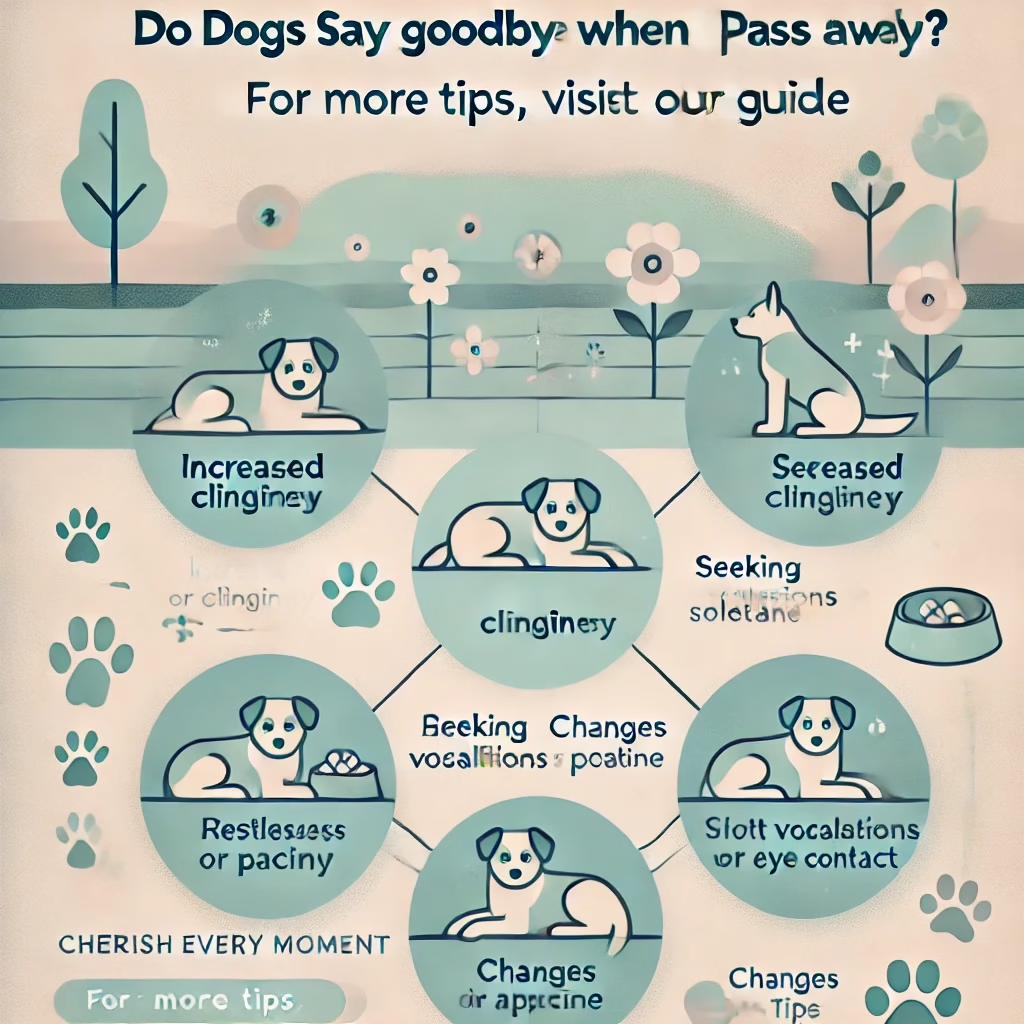Table of Contents

Introduction: The Emotional Bond Between Humans and Dogs
If you’ve ever doubted, do dogs say goodbye when they pass away? you’re not alone. Dogs are more than just pets; they’re family. Their unconditional love, occasional tricks, and safe loyalty make saying goodbye one of the hardest experiences for pet parents. Many dog owners have shared pleasing and sometimes painful stories of their furry friends behaving differently in their final moments. It’s natural to question whether these behaviors are their way of saying goodbye.
In this article, we’ll explore the signs that dogs may be aware of their final moments, how they can connect their goodbyes, and what you can do to comfort your beloved pet during this emotional time.
Can Dogs Sense When They Are Nearing the End?
A Dog’s Intuition: Do They Know?
Dogs are really intuitive creatures. Their delicate senses allow them to pick up on subtle changes in their environment and even within their own bodies. While science can’t finally say whether dogs “know” they’re nearing the end, their behavior often suggests an awareness.
Some dogs may start seeking extra comfort, staying closer to their owners, or looking at them with an expressive intensity. Others might flight, finding a quiet spot to be alone. These behaviors reflect what many animals do in the wild, seeking either friendship or privacy.
What the Experts Say
Veterinarians and animal behaviorists have observed these forms for years. They note that dogs might not “understand” death as humans do but may sense physical changes like decreased energy or discomfort, warning behavioral shifts.
Signs Dogs May Be Saying Goodbye
Behavioral Changes to Watch For
Increased Clinginess:
Some dogs may quickly desire constant attention, following you everywhere or inclined on you more than usual.
Isolation:
Conversely, others may seek privacy, hiding in corners or under furniture.
Restlessness:
Pacing or acting worried can indicate discomfort or anxiety.
Changes in Affection:
A once remote dog might become unusually warm or vice versa.
Physical Signs of a Goodbye
Loss of Appetite:
A dog nearing the end might stop eating altogether, even rejecting their favorite treats.
Difficulty Breathing:
Difficult or shallow breathing can signal that the end is near.
Decreased Mobility:
Weakness or difficulty moving is another common sign.
Understanding these signs can help you identify when your dog might be “saying goodbye” and give you time to prepare emotionally.
Understanding Dogs’ Behavior in Their Final Moments
Non-Verbal Message
Dogs are masters of non-verbal message. Even in their last days, they may use delicate signs to express their needs or emotions. Look out for things like kind tail wags, soft languages, or remaining eye contact. These small signs could be their way of saying, I’m still here with you.
Instinctive Solitude
In the wild, dogs and other animals often separate themselves when they sense their time is near. This nature to retreat may obvious in your dog suddenly sleeping in rare spots or spending time away from the family.
Identifying these behaviors can help you respond with compassion and create a comforting environment for your pet.
How to Comfort Your Dog During Their Final Days
Practical Ways to Show Love
Create a Peaceful Space:
Make sure your dog’s favorite spot is cozy, quiet, and free of disturbances.
Physical Comfort:
Offer gentle petting, soft blankets, and warm sheet to ease their discomfort.
Quality Time:
Spend as much time as you can with your dog talk to them, hold them, and comfort them they’re loved.
Veterinary Support
Speak with your vet about pain management or relaxing care options. They can guide you in making your dog’s final days as comfortable as possible.
Treasuring these moments ensures your dog feels your love until the very end.
Managing With the Loss of a Pet
Preparing Warmly
Saying goodbye to a pet is never easy. Allow your sadness and realize that it’s okay to feel a mix of feelings sadness, guilt, even anger. Every pet owner’s grieving process is unique.
Finding Support
Lean on friends, family, or online pet communities who’ve experienced similar losses. Sharing your feelings can provide huge comfort.
Honoring Your Dog’s Memory
Create a tribute to your dog, whether it’s through a book, a paw print reminder, or planting a tree in their memory. Remember, the love you shared with your dog is eternal.
“Understanding Pet Loss and Grief”
For more support on managing with the loss of a pet, visit the American Kennel Club’s Guide to Pet Loss and Grieving.
Conclusion
Dogs might not say goodbye with words, but their actions and presence speak volumes. Whether through lasting gazes, gentle touches, or seeking comfort, your dog’s behavior in their final days is their way of expressing love and appreciation. By identifying these signs and providing comfort, you can confirm their journey is as peaceful as possible. Remember, their memory will always live on in your heart.
FAQS
1. Do dogs say goodbye when they pass away?
Yes, many dogs show delicate behavioral and physical signs that may seem like their way of saying goodbye. These include seeking extra comfort, dividing themselves, or displaying peace in their final moments.
2. How do dogs say goodbye when they pass away?
Dogs may connect their goodbye through increased love, lasting eye contact, restlessness, or receding to a quiet place. These behaviors can vary based on the dog’s personality and natures.
3. Can dogs sense when they are about to pass away?
While it’s not proven that dogs know death as humans do, they often sense physical changes in their body and may perform differently as a result. This awareness can lead to actions that feel like a goodbye.
4.Why do some dogs isolate themselves when they passes away?
Dogs may automatically seek privacy when they’re nearing the end, mimicking behaviors seen in the wild. This is often a natural reply to protect themselves and reserve energy.
5. What can I do if my dog is saying goodbye?
If your dog shows signs of saying goodbye, offer comfort by staying close, making a peaceful situation, and ensuring they’re not in pain. Consult a vet to explore soothing care options and treasure the time you have left together.
Source:
https://www.psychologytoday.com/gb/blog/animal-emotions/202308/do-dogs-understand-when-theyre-dying

2 thoughts on ““Do Dogs Say Goodbye When They Pass Away? 7 Heartfelt Signs””